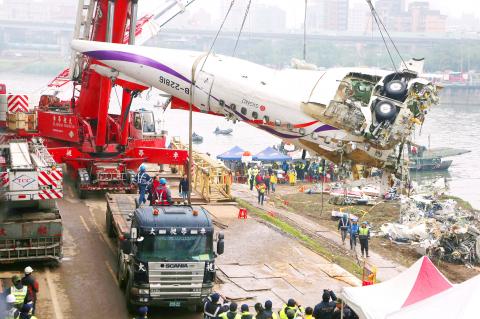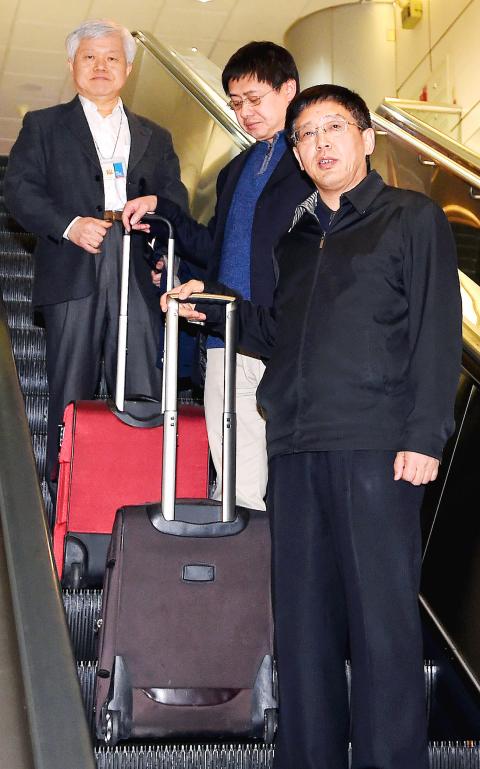The Executive Yuan yesterday said China would take part in the investigation of the crash of TransAsia Airways (復興航空) Flight GE235, adding that the move is “in accordance with international conventions.”
Executive Yuan spokesperson Sun Lih-chyun (孫立群) confirmed that China is to participate in the investigation and the government would ask the Mainland Affairs Council to pay extra attention to the issue of jurisdiction to prevent it being overstepped.
A Cabinet official said that according to the Convention on International Civil Aviation’s Aircraft Accident and Incident Investigation standards, the nation in which the aircraft is registered, the nations where its passengers were from and the nation that built or manufactured the aircraft are all entitled to take part in an investigation.

Photo: CNA
The official added that a “cross-strait cooperation agreement on flight safety and airworthiness directive” is under negotiation, although not yet signed, and the basic framework of the agreement would be used for the two nations to work on the investigation.
As Flight GE235 was carrying 31 Chinese passengers, Aviation Safety Council Executive Director Thomas Wang (王興中) said that China said it wanted to participate in the investigation.
“We have contacted Chinese government officials and informed them that the council can help them secure documents to enter the nation. However, Beijing has yet to indicate who and how many officials would come,” he said, adding that this would be the first time Chinese officials would join the council in an aircraft accident investigation.

Photo: Chu Pei-hsiung, Taipei Times
China’s Taiwan Affairs Office spokesperson Ma Xiaoguang (馬曉光) said in Beijing that there exists a communication mechanism between the two nations for inviting participation in investigations should major aircraft accidents occur.
Ma said that Taiwan has issued an invitation and confirmed that China’s civil aviation department would send personnel to assist in the investigation, adding that the group would be coming to Taiwan for a civil aviation “mini cross-strait meeting” — a term that puts emphasis on its non-governmental nature.
Some netizens cast doubt on the government’s consent to Chinese participation. A netizen with the username “Karsho” said on the Professional Technology Temple (PTT) Web site — the nation’s largest online bulletin board — that according to Article 26 of the Convention on International Civil Aviation: “In the event of an accident to an aircraft of a contracting state occurring in the territory of another contracting state ... the state in which the accident occurs will institute an inquiry into the circumstances of the accident, in accordance, so far as its laws permit, with the procedure which may be recommended by the International Civil Aviation Organization.”
Insofar as Taiwan is both the nation where the accident occurred and the nation in which the aircraft was registered, “Taiwan should have exclusive jurisdiction over the investigation ‘according to the regulations’ and should not have China overstep like this,” Karsho said.
“We sent our people to Japan, with the consent of the Japanese government for the China Airlines (中華航空) crash in Nagoya in 1994 to gain knowledge of the events,” Karsho said. “As investigation is part of the authority of the nation where the accident occurred, Taiwan at the time could only wait for Japan’s official investigation report.”
Other netizens questioned whether Taiwan had been allowed to participate in the investigation of the Qiandao Lake (千島湖) incident in China’s Zhejiang Province in 1994, and said that China might take this as an opportunity to act as if it was sovereign over Taiwan.
“Why do we want a nation that follows the rule of one man to participate in the investigation of a nation abiding by the rule of law?” a netizen asked.
Democratic Progressive Party Legislator Lee Kun-tse (李昆澤) said that according to the international convention and cross-strait agreements, China could send a specialist to Taiwan to obtain information about what happened, to undertake the task of identifying the people killed and gain access to the investigation report, but it has no right to participate in the judicial investigation.
Chinese Nationalist Party (KMT) Legislator Lo Shu-lei (羅淑蕾) asked the public not to “politicize everything” and said it is understandable that China wants to know more as the accident involves its citizens.
Additional reporting by Shelley Shan

AGING: As of last month, people aged 65 or older accounted for 20.06 percent of the total population and the number of couples who got married fell by 18,685 from 2024 Taiwan has surpassed South Korea as the country least willing to have children, with an annual crude birthrate of 4.62 per 1,000 people, Ministry of the Interior data showed yesterday. The nation was previously ranked the second-lowest country in terms of total fertility rate, or the average number of children a woman has in her lifetime. However, South Korea’s fertility rate began to recover from 2023, with total fertility rate rising from 0.72 and estimated to reach 0.82 to 0.85 by last year, and the crude birthrate projected at 6.7 per 1,000 people. Japan’s crude birthrate was projected to fall below six,

Conflict with Taiwan could leave China with “massive economic disruption, catastrophic military losses, significant social unrest, and devastating sanctions,” a US think tank said in a report released on Monday. The German Marshall Fund released a report titled If China Attacks Taiwan: The Consequences for China of “Minor Conflict” and “Major War” Scenarios. The report details the “massive” economic, military, social and international costs to China in the event of a minor conflict or major war with Taiwan, estimating that the Chinese People’s Liberation Army (PLA) could sustain losses of more than half of its active-duty ground forces, including 100,000 troops. Understanding Chinese

SELF-DEFENSE: Tokyo has accelerated its spending goal and its defense minister said the nation needs to discuss whether it should develop nuclear-powered submarines China is ramping up objections to what it sees as Japan’s desire to acquire nuclear weapons, despite Tokyo’s longstanding renunciation of such arms, deepening another fissure in the two neighbors’ increasingly tense ties. In what appears to be a concerted effort, China’s foreign and defense ministries issued statements on Thursday condemning alleged remilitarism efforts by Tokyo. The remarks came as two of the country’s top think tanks jointly issued a 29-page report framing actions by “right-wing forces” in Japan as posing a “serious threat” to world peace. While that report did not define “right-wing forces,” the Chinese Ministry of Foreign Affairs was

US President Donald Trump in an interview with the New York Times published on Thursday said that “it’s up to” Chinese President Xi Jinping (習近平) what China does on Taiwan, but that he would be “very unhappy” with a change in the “status quo.” “He [Xi] considers it to be a part of China, and that’s up to him what he’s going to be doing, but I’ve expressed to him that I would be very unhappy if he did that, and I don’t think he’ll do that. I hope he doesn’t do that,” Trump said. Trump made the comments in the context